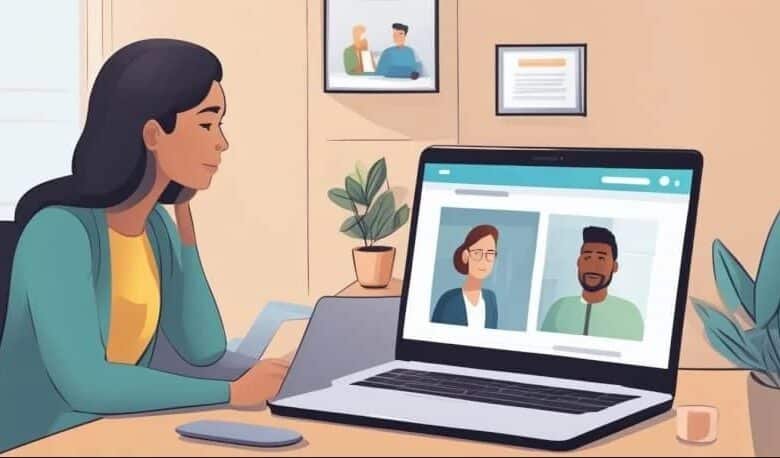Online Therapy for Anxiety and Depression

In today’s fast-paced world, mental health challenges like anxiety and depression are becoming increasingly common. Fortunately, the advent of online counselling has made mental health support more accessible than ever. Online therapy offers individuals the chance to speak to qualified professionals from the comfort of their own homes, making it a popular option for many. In this article, we’ll explore how online therapy can be an effective solution for managing anxiety and depression, as well as what to expect from an online counselling session.
Why Online Therapy is Important for Mental Health
Online therapy for anxiety and depression is not just a convenience—it’s a necessity in today’s digital age. Mental health issues often go unaddressed due to stigma, lack of access to qualified professionals, or even time constraints. Online therapy in India has emerged as an effective alternative, especially during and after the pandemic, helping countless people connect with licensed therapists without geographical limitations. With the growing number of online platforms, seeking help has become more flexible and affordable.
How Online Therapy Works
Online therapy, often conducted through video calls, chat, or phone, provides a virtual space where individuals can share their feelings, challenges, and mental health concerns. Sessions with an online psychologist are structured to resemble in-person therapy, with the same level of confidentiality and professional care. The key benefit is that it eliminates the need for commuting to a therapist’s office, making it ideal for those with busy schedules or mobility issues.
A typical online counselling session for anxiety or depression includes the following steps:
Initial Assessment: The therapist gathers information about the client’s mental health history, symptoms, and specific concerns.
Therapeutic Approach: Based on the assessment, the therapist may use methods such as Cognitive Behavioral Therapy (CBT), mindfulness-based techniques, or talk therapy to help the client manage their symptoms.
Goal Setting: Clear, achievable goals are set for managing anxiety and depression, and these goals are reviewed periodically to track progress.
Benefits of Online Therapy for Anxiety and Depression
Convenience and Accessibility
One of the most significant advantages of online therapy is the convenience it offers. Whether you are at home, traveling, or living in a remote area, you can easily access therapy sessions without having to travel long distances. For individuals dealing with anxiety or depression, which can often make leaving the house challenging, this is a huge benefit.
Affordability
Compared to traditional therapy, online sessions tend to be more affordable. This makes it accessible for a larger group of people, particularly in places where therapy is seen as a luxury. In countries like India, the affordability of online therapy sessions has allowed more individuals to seek help without worrying about high costs.
Privacy and Confidentiality
For those who feel hesitant or embarrassed about seeking help, online therapy offers a level of privacy that may not be available in traditional therapy settings. Online platforms are designed to protect users’ confidentiality, ensuring that their information remains secure.
Effective Treatment for Anxiety and Depression
Several studies have shown that online therapy is as effective as in-person therapy for treating anxiety and depression. The flexibility to choose when and how to attend therapy can reduce the stress of managing these mental health conditions. For example, individuals suffering from social anxiety may find it easier to open up in the safety of their own environment.
Challenges of Online Therapy
While online therapy has many advantages, it’s essential to acknowledge some potential challenges:
Technology Issues: A stable internet connection and access to devices are necessary for a smooth therapy session. Technical difficulties can sometimes disrupt the flow of therapy.
Non-Verbal Cues: In face-to-face therapy, therapists can pick up on body language and other non-verbal cues. While video sessions can help with this, it’s not always as effective as in-person interactions.
Limited Emergency Care: Online therapists may not be able to provide immediate help in crisis situations, making it essential to have emergency contacts or local services available.
How to Choose the Right Online Therapist
Selecting the right therapist is crucial to the success of your online therapy experience. Here are some tips to keep in mind:
Check Credentials: Make sure your therapist is licensed and qualified to handle anxiety and depression.
Read Reviews: Look for testimonials or reviews of the therapist or platform you’re considering to ensure that others have had positive experiences.
Compatibility: It’s important to feel comfortable with your therapist. Many platforms offer free initial consultations, which can help you gauge whether a particular therapist is right for you.
Specialization: Look for therapists who specialize in treating anxiety and depression specifically. This ensures that the therapist is familiar with the most effective techniques for managing these conditions.
FAQs
Is online therapy as effective as in-person therapy for anxiety and depression? Yes, research has shown that online therapy is just as effective as in-person therapy for treating mental health conditions like anxiety and depression. It offers flexibility and accessibility, which can enhance the overall treatment experience.
What happens during an online counselling session? During an online counselling session, you’ll connect with a licensed therapist via video, phone, or chat. The therapist will guide you through your mental health concerns, offering strategies and coping mechanisms tailored to your needs.
Can I choose the type of therapy for my sessions? Yes, most online platforms allow you to choose between different therapeutic approaches, such as Cognitive Behavioral Therapy (CBT), mindfulness-based therapy, or psychodynamic therapy, depending on what best suits your needs.
Are online therapy sessions confidential? Absolutely. Reputable online therapy platforms follow strict privacy protocols to ensure that all your personal and medical information is kept confidential. Always check the privacy policy of the platform you choose to use.
How long do online therapy sessions usually last? Online therapy sessions typically last between 45 minutes to an hour, depending on the therapist and the platform you choose. The length of sessions can sometimes be customized based on your specific needs.
Conclusion
Online therapy for anxiety and depression offers a convenient, affordable, and effective way to manage mental health challenges. With more people embracing the flexibility of online therapy sessions, it’s easier than ever to prioritize your mental well-being. By connecting with a qualified online psychologist, you can get the support you need to navigate life’s difficulties, all from the comfort of your home.




